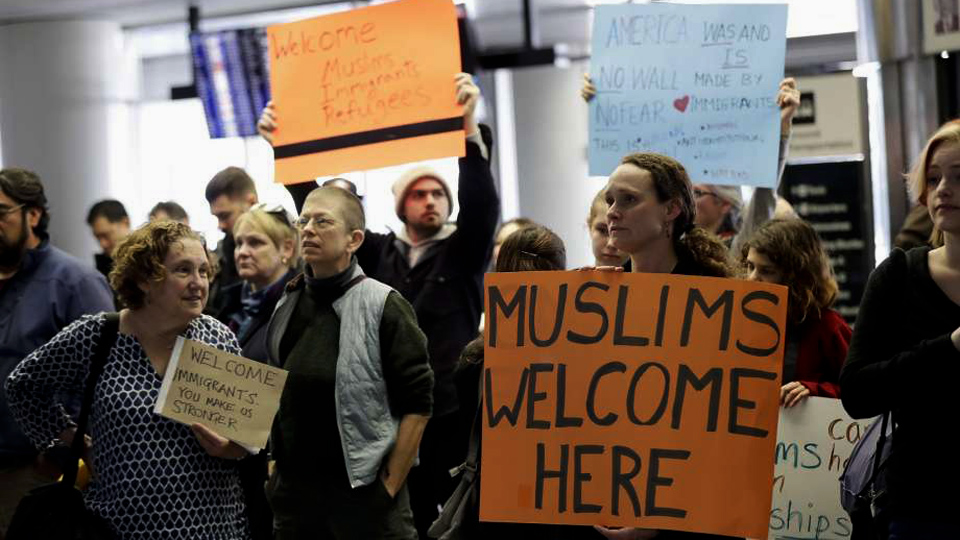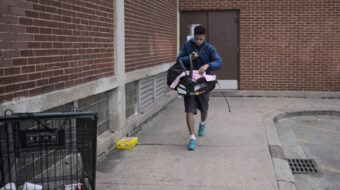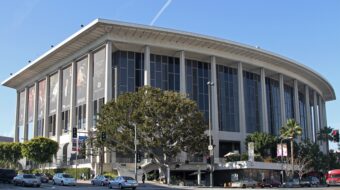
OAKLAND, Calif. – This city could become the first in the nation to boycott firms helping to build the wall President Trump plans along the U.S.-Mexico border.
At the City Council meeting Feb. 2, Councilmember Abel Guillén introduced a resolution denouncing Trump’s executive order to build the wall, and “to the extent practicable,” calling on city departments to avoid entering new or amended contracts for goods or services from any company involved in building the wall.
If approved by the Council’s Rules and Legislation Committee, the measure is expected to come before the whole Council early next month. Estimates say upwards of a quarter of city residents are immigrants.
Earlier, on Jan. 31, the Oakland City Council voted to set up a $300,000 fund over two years, to support a “rapid response network” of 12 organizations to help families threatened with separation who can’t afford legal representation. Oakland is already a sanctuary city.
The surrounding county, Alameda County – also a sanctuary – followed suit a week later by earmarking $750,000 for its Social Services Committee to use to defend immigrants and refugees. The appropriation will be matched by an anonymous donor, giving the county $1.5 million for the purpose. Board President Wilma Chan noted that 30 percent of county residents were born outside the U.S., and a quarter of them remain undocumented.
The county’s decision followed the actions taken in late December by the county and city of Los Angeles to join with private foundations in establishing a $10 million fund to defend immigrants facing deportation. An estimated 815,000 undocumented people currently live in LA County.
Also this week, the state’s new Attorney General, Xavier Becerra, joined with attorneys-general from 15 other states in filing a “friend-of-the-court” brief with the Ninth Circuit Court of Appeals, stating that the president’s temporary restrictions on travel from seven largely Muslim countries “has inflicted and continues to inflict harm on state colleges and universities around the country” that depend on faculty and students from other countries. All the attorneys-general signing the brief are Democrats, while seven come from states with Republican governors.
The Ninth Circuit Court is now considering Washington state and Minnesota’s challenge to President Trump’s executive order, with a ruling expected later this week.
In their brief, the attorneys-general charged that the president’s order “abruptly” barring many tourists and students from coming to the 15 states has “directly and immediately” cut revenues to state academic institutions and tax authorities.
Tech companies such as eBay, Apple and Google – all major players in California’s economy – are saying in their briefs that the order makes it harder for their companies to attract talent, increases their business costs, makes it harder for U.S. companies to compete internationally, and encourages international companies to build facilities and hire workers outside the U.S.
California school districts have also joined the fray. State Superintendent of Public Instruction Tom Torlakson is calling on districts around the state to declare they are “safe havens” for immigrant children.
Torlakson emphasized that California schools welcome all students “regardless of their heritage, religion, ethnicity, background, disability or sexual orientation.” Calling diversity “California’s strength,” he added, “We do not just welcome diversity, we celebrate it.”
Among the districts already declaring their support for immigrant students are Los Angeles, San Bernardino, Sacramento, Stockton, San Francisco and Oakland, while San Jose, Riverside, Long Beach and Fremont are expected to submit resolutions to their boards for approval.
In a Feb. 5 interview with Fox News’ Bill O’Reilly, Trump reacted to these developments by threatening to defund “out-of-control” California. His charges were met with separate statements from the heads of the two houses of the state legislature, both pointing to the size of the state’s economy and emphasizing California’s vital role in the national economy.
Senate President Pro Tem Kevin de Leόn, D-Los Angeles, called the threat “not only unconstitutional but emblematic of the cruelty he seeks to impose on our most vulnerable communities.” He noted that Californians contribute more to the national government than the state gets in return, and warned that sanctions on the state would have nationwide consequences.
Assembly Speaker Anthony Rendon, D-Paramount, called on other states to be similarly “out-of-control.”
Governor Jerry Brown, a Democrat, is also on record saying the state “may be called upon to defend” legislation passed in recent years to protect immigrants, and “defend them we will.”
Meanwhile, emphasizing the importance of California’s longstanding cross-border relationships,
San Diego’s Mayor Kevin Faulconer, a Republican, held a joint news conference with Mayor Juan Manuel Gastélum of the Mexican city of Tijuana, on the other side of the country’s busiest border crossing.
While not mentioning the president’s statements, the two emphasized the importance of their cities’ longstanding collaboration, which involves many functions.
Tijuana’s mayor pointed to the need to “keep the momentum strong,” while Faulconer told how international trade and investment have brought over 110,000 jobs to his city.
The mayors are among many along the U.S.-Mexico border who have come together in recent days to emphasize the importance of their cross-border relationships.

MOST POPULAR TODAY

High Court essentially bans demonstrations, freedom of assembly in Deep South

Zionist organizations leading campaign to stop ceasefire resolutions in D.C. area

U.S. imperialism’s ‘ironclad’ support for Israel increases fascist danger at home


UN warns that Israel is still blocking humanitarian aid to Gaza






Comments